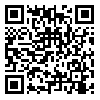BibTeX | RIS | EndNote | Medlars | ProCite | Reference Manager | RefWorks
Send citation to:
URL: http://jdisabilstud.org/article-1-2916-en.html
2- Assistant Professor, Department of Psychology and Education of Exceptional Children, Faculty of Literature, Humanities and Social Sciences, Science and Research Branch, Islamic Azad University, Tehran, Iran
3- Distinguished Professor, Faculty of Psychology and Education, University of Tehran, Tehran, Iran
Abstract
Background & Objectives: The most essential part of a person's life is childhood, which is spent in the family. The presence of conflicts, family violence, poverty, and addiction in the family leads to a decrease in mental health and an increase in behavioral disorders in children. As a result, fear and anxiety develop in children. Since emotional and behavioral problems often do not decrease naturally, increasing attention has been paid to the prevention and treatment of childhood problems and disorders. One of the newest and, at the same time, the most effective form of intervention is mindfulness for children. This intervention involves being actively present at the moment or being mindful, which is the opposite of inattention or a state of automatic guidance. Active presence in the moment is defined as a state of aroused attention and awareness of what is happening in the current moment. The results of numerous research studies show that mindfulness is effective and very promising in reducing students' anxiety. The studies have also demonstrated that family–oriented interventions improve people's levels of wellbeing and mental health. Also, the emotional relationship between parent and child is effective in the process of play. During play with their children, parents can be more effective for their children than therapists. Parents trained in this field are good substitutes as therapists for their children, and by teaching in the form of games, they reach a favorable understanding and acceptance in connection with the child's behavior. However, a family–oriented game program based on mindfulness has not been designed for 8–12 years old students with behavioral disorders to check its effectiveness on their anxiety. Therefore, the novelty of the research topic emphasizes its necessity. In this regard, the present study investigated the efficacy of the family–oriented game program based on mindfulness on the anxiety of students with behavioral disorders in Tehran City, Iran.
Methods: This quasi–experimental research employed a pretest–posttest design with a control group. The statistical population comprised all volunteer students with behavioral disorders aged 8 to 12 years living in Tehran in the 2019–1400 academic year. Of whom, 30 students (17 girls and 13 boys) were selected using the available sampling method. They were chosen with their families and randomly allocated to the experimental and control groups. The inclusion criteria were as follows: lacking acute or chronic physical diseases, not participating in concurrent treatment programs, and not receiving personal consultation or medication therapy. The exclusion criteria were as follows: absence of more than two sessions in the intervention and dissatisfaction with continuing the study. The research was done in two stages. First, the program of family–centered games based on mindfulness was compiled based on theoretical literature and research backgrounds, and its content validity was evaluated and confirmed by experts. Then, the experimental group participants received 10 sessions of the prepared program. Data was collected using The Children’s Behavioral Checklist (Achenbach, 1979) and Spence Children's Anxiety Scale (Spence, 1998). The obtained data were analyzed using the statistical covariance analysis method at a significance level 0.05 using SPSS software version 18.
Results: The results showed that after removing the effect of the pretest, the mean scores of the anxiety subscales including panic and fear of open spaces (p<0.001), separation anxiety (p<0.001), fear of physical harm (p<0.001), social fear (p<0.001), practical obsession (p<0.001), public anxiety (p<0.002), and general anxiety (p<0.001) were significantly different between the experimental and control groups in the posttest.
Conclusion: Implementing mindfulness–based family–oriented game programs is effective in reducing the anxiety of children with behavioral disorders.
| Rights and permissions | |
 |
This work is licensed under a Creative Commons Attribution-NonCommercial 4.0 International License. |




